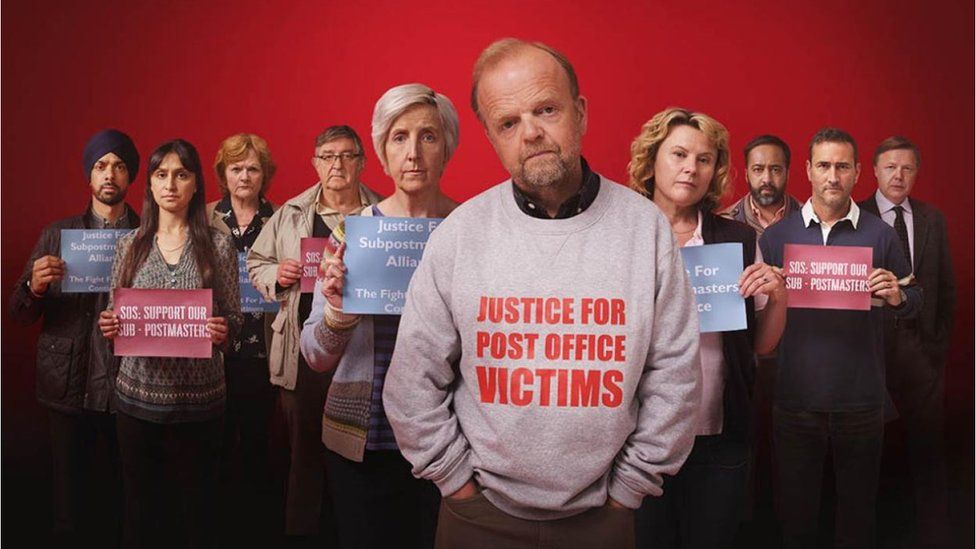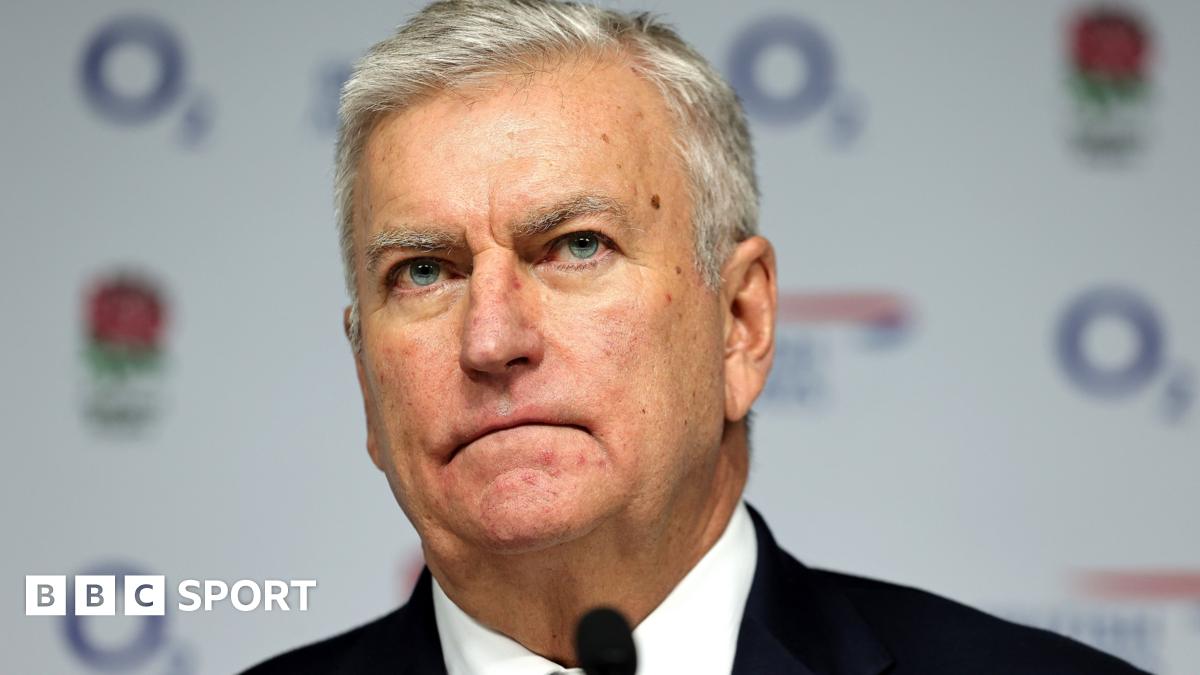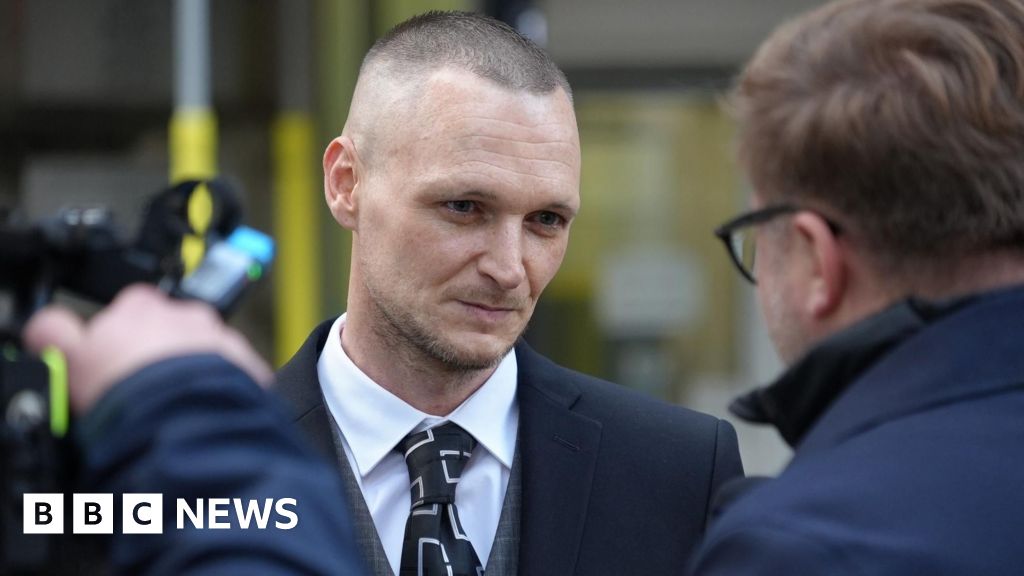 Image source, ITV
Image source, ITV
ITV's drama starring Toby Jones has sparked renewed debate over the Post Office scandal
By Vishala Sri-Pathma and Emma Simpson
BBC News
The Metropolitan Police is investigating the Post Office over potential fraud offences committed during the Horizon IT scandal.
Over a 15-year period, more than 700 branch managers were convicted of false accounting, theft and fraud, based on faulty software information.
It has been called the most widespread miscarriage of justice in UK history.
Police are now investigating possible fraud offences arising from the prosecutions.
The Met Police said the potential offences could have been related to "monies recovered from sub-postmasters as a result of prosecutions or civil actions".
The force had already been looking into potential offences of perjury and perverting the course of justice in relation to investigations and prosecutions carried out by the Post Office.
Two people have been interviewed under caution but nobody has been arrested since the investigation was launched in January 2020.
It comes after 50 new potential victims of the scandal came forward following an ITV drama on the issue, which first aired this week.
The Post Office previously said it encourages "people who believe they were wrongly convicted, for any reason, to consider an appeal".
However, it added that it would be inappropriate to comment on any police investigation.
Show 'reignited whole issue again'
Between 1999 and 2015 more than 700 sub-postmasters were prosecuted and convicted based on information from a faulty accounting system, Horizon, which made it look like money was missing.
Some sub-postmasters wrongfully went to prison, many were financially ruined and forced to declare bankruptcy, while others describe being shunned by their communities following convictions for false accounting and theft. Some have since died.
To date, 93 convictions have been overturned and, of those, only 27 people have agreed "full and final settlements".
Some 54 cases have resulted in convictions being upheld, people being refused permission to appeal, or people withdrawing from the process, according to the Post Office.
A public inquiry into the scandal is ongoing.
There has been widespread sympathy for the victims after the four-part mini-series Mr Bates vs the Post Office: The Real Story aired on ITV this week.
It centres on the story of sub-postmaster Alan Bates, played by actor Toby Jones, who led and won a legal battle, paving the way for dozens of convictions to be overturned.
Neil Hudgell, executive chairman of Hudgells, one of the law firms acting for the claimants, says the TV drama has been instrumental in encouraging new cases to come forward.
"The majority of [those 50 new enquiries]... were not prosecuted but lost their livelihoods, lost their homes," he said.
"But there's a small handful of people who were convicted that have come forward, three in total at the moment, which is obviously a tiny number proportionate to those that are still out there."
He also told the BBC that one of the three people that had been convicted has received inpatient psychiatric care.
Mr Hudgell said the drama had brought to light the trauma of what the sub-postmasters went through: "It's brought huge widespread sympathy to these people so alongside that, family encouragement and speaking to other postmasters that have been along this journey, they have found the courage to come forward."
Alan Bates told BBC Radio 4's Today programme that his portrayal in the mini-series had "made a huge difference to the campaign". "It's reignited the whole issue again."
Mr Bates said the cast "really managed to get over the real suffering and persecution they'd suffered over the years from Post Office".
Asked why he thought new cases have come forward since the show aired, Mr Bates said some people "just did not know what had been going on over the years with the campaign".
"Some people take support from other victims standing up and being identified and that's given people the confidence to come forward."
However, Mr Bates said: "The big hold up for the compensation is to speed the bureaucracy up which is holding up the payments to all these people.
"They really must light a fire under their officials to get this sorted," Mr Bates said, and added that about 60 to 70 claimants had died before getting justice.
Actor Toby Jones told the Today programme that when he read the script, he realised it was about "modest good people, as surprised as the audience are now by what they were up against".
"It's very easy to understand. A computer system made an error and loads of people suffered as a result and when they rang the helpline, the helpline didn't help them," Jones said.
"It did the opposite and began to prosecute them for fraud. It's so straightforward you think it can't possibly be true.
"Alan took out this gargantuan task of trying to unite these disparate people who felt they were all isolated.
"The drama starts there when individuals become a chorus and they become unstoppable; this is what makes it great."
Actress Julie Hesmondhalgh, who plays Alan Bates's partner Suzanne Sercombe in the programme, said she was "completely overwhelmed" by the response to the show and "the outpouring of outrage over the scandal and cover-up".
"It's more than any of us dared hope that it would move the campaign along, but sometimes drama can do that. And now: JUSTICE for the thousands affected," she wrote on X, formerly Twitter.
Image source, Getty Images
Image caption,Julie Hesmondhalgh, who plays Alan Bates's partner Suzanne Sercombe, called for justice for those affected
Several financial compensation schemes have been set up to help those caught up in the scandal, although concerns have been raised about delays in payment.
Prime Minister Rishi Sunak told reporters on Friday: "It's important that all those affected get the support they need, which I am pleased is happening and we will keep going as quickly as possible."
Last month, a board overseeing compensation called for all Post Office staff wrongly accused of theft and false accounting to have their convictions overturned.
A Post Office spokesperson said: "We share fully the aims of the public inquiry to get to the truth of what went wrong in the past and establish accountability.
"It's for the inquiry to reach its own independent conclusions after consideration of all the evidence on the issues that it is examining."
 (1).png)
 1 year ago
17
1 year ago
17


















